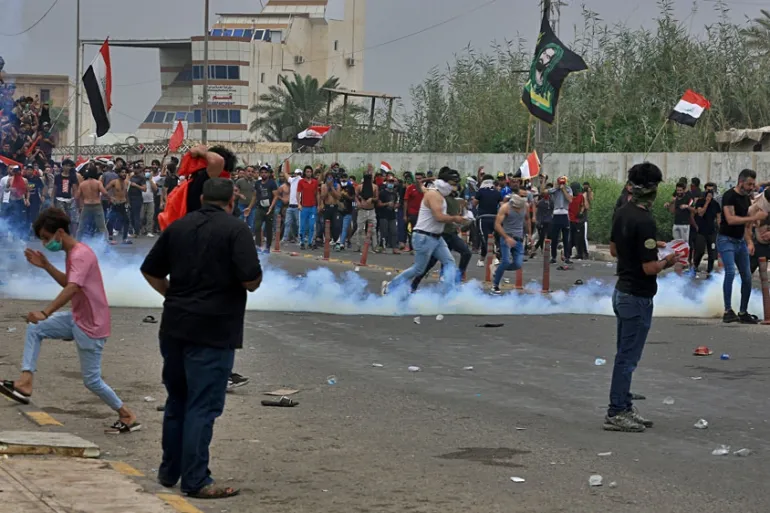
Iraqi police used tear gas to disperse protesters in Baghdad on October 24, 2019. [Nabil al-Jurani/AP]
Over 65% of exports
Iraq emerges as largest buyer of South Korean-made tear gas
BAGHDAD — Iraq has become the predominant purchaser of South Korean-made tear gas, accounting for nearly 70% of the country’s exports of the riot control agent in the first half of this year, according to police data released on Sunday.
The Korean National Police Agency data, provided by Rep. Yong Hye-in of the Basic Income Party, showed that Iraq imported 478,000 of the 713,000 tear gas canisters exported by South Korea between January and June, representing 67% of the total exports. South Korea’s tear gas exports have surged, totaling 1.58 million canisters last year alone, marking a 148% increase from the previous year.
Since 2019, South Korea has exported 4.73 million tear gas canisters to 25 countries, with Iraq being the largest recipient. Over the past five and a half years, Iraq has imported more than 1.2 million canisters, including 732,000 in 2023 and an additional 478,000 in the first half of this year. Indonesia and the Philippines followed as the next largest importers, with 649,000 and 625,000 canisters respectively.
The increase in tear gas imports by Iraq coincides with ongoing protests in the country, driven by issues such as power outages, water shortages, and extreme summer heat. Reports from local media indicate that Iraqi security forces have frequently used tear gas and live ammunition to disperse demonstrators.
The peak of tear gas usage in Iraq was during the Tishreen protests, which began in October 2019 and continued into 2020. Sparked by widespread dissatisfaction with perceived corruption, unemployment, inadequate public services, and foreign interference, these protests saw over 600 protesters killed and more than 20,000 injured. Iraqi security forces and paramilitary groups used tear gas, live ammunition, and other forceful measures to suppress the demonstrations.
A 2019 report by Human Rights Watch highlighted the excessive use of tear gas during these protests. “Security forces have fired teargas cartridges directly at protesters in Baghdad on numerous occasions since protests resumed on October 25, 2019, killing at least 16,” the report stated. “The high death toll includes people who took direct hits to the head from teargas cartridges, in numbers that suggest a gruesome pattern rather than isolated accidents,” commented Sarah Leah Whitson, Middle East director at Human Rights Watch.
The Tishreen protests ultimately led to the resignation of Prime Minister Adil Abdul-Mahdi’s government and reforms to Iraq’s electoral law, culminating in the Oct. 2021 parliamentary elections.
Expressing concern over the use of South Korean-made tear gas to “suppress human rights” in Iraq, Rep. Yong announced plans to propose revisions to the Foreign Trade Act. These revisions aim to impose economic sanctions and restrict the export of tear gas to countries with a high likelihood of human rights violations.
International human rights standards mandate that law enforcement use force only when strictly necessary and that tear gas should be deployed to prevent further harm, ensuring proportionality to the threat and, where possible, preceded by warnings, particularly when children are present. The deliberate use of lethal force is permitted only when necessary to protect life.





